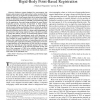Free Online Productivity Tools
i2Speak
i2Symbol
i2OCR
iTex2Img
iWeb2Print
iWeb2Shot
i2Type
iPdf2Split
iPdf2Merge
i2Bopomofo
i2Arabic
i2Style
i2Image
i2PDF
iLatex2Rtf
Sci2ools
IPMI
1999
Springer
1999
Springer
The Distribution of Target Registration Error in Rigid-Body, Point-Based Registration
—Guidance systems designed for neurosurgery, hip surgery, spine surgery and for approaches to other anatomy that is relatively rigid can use rigid-body transformations to accomplish image registration. These systems often rely on point-based registration to determine the transformation and many such systems use attached fiducial markers to establish accurate fiducial points for the registration, the points being established by some fiducial localization process. Accuracy is important to these systems, as is knowledge of the level of that accuracy. An advantage of marker-based systems, particularly those in which the markers are bone-implanted, is that registration error depends only on the fiducial localization and is, thus, to a large extent independent of the particular object being registered. Thus, it should be possible to predict the clinical accuracy of marker-based systems on the basis of experimental measurements made with phantoms or previous patients. For most registration ...
| Added | 04 Aug 2010 |
| Updated | 04 Aug 2010 |
| Type | Conference |
| Year | 1999 |
| Where | IPMI |
| Authors | Jay B. West, J. Michael Fitzpatrick |
Comments (0)

